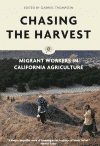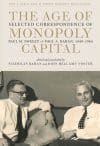Review

Situated largely within the Marxist debates on imperialism—but addressing the liberal formulations too—The Changing Face of Imperialism: Colonialism to Contemporary Capitalism is an important intervention regarding the material basis of imperialism and its three-hundred-year-old history of unequal power relations. The book broadly addresses five issues: (1) the nature of finance capital and the novel yet familiar processes of value extraction; (2) the world of capital; (3) global production networks and labor regimes; (4) the institutional system of nation-states in the new global order; and (5) the nature of integration from colonial regimes to now. | more…

A Caste System Enforced by State Power
“No one comes out here. No one knows what we go through,” Roberto Valdez, a farmworker in the Coachella Valley town of Thermal, California, tells Gabriel Thompson, the interviewer and editor of Chasing the Harvest, a recently published book of interviews with farmworkers, growers, union activists, teachers, and others. And as one reads through the compelling stories that are told in the collection, one gets a deep sense of what Roberto means, as well as a passionate urge to have others know of the life and work of those who labor in California’s fields. | more…

Capitalism has many victims, but few fare as badly as slaughterhouse workers. Every day, meatpacking workers risk life and limb to provide cheap meat for consumers. Despite this, political scientist Timothy Pachirat once described slaughterhouse work as a form of labor “considered morally and physically repellent by the vast majority of society that is sequestered from view rather than eliminated or transformed.” Yet, slaughterhouses are the sites of some of labor’s greatest triumphs. Lynn Waltz documents one such triumph in her book Hog Wild, which describes how meatpacking workers successfully established a union at the Tar Heel slaughterhouse in North Carolina. While Waltz focuses on the particular fight at the Tar Heel plant, the unionization success of the workers there provides important lessons for future labor struggles. | more…

Germany is commonly perceived as a strong, dependable island amid a sea of gyrating European uncertainties, a down-to-earth, dependable ally in attempts by the better U.S. presidents to move the world forward as steadily as possible. For the past thirteen years, this view has been personified in the clear, undramatic words and deeds of Angela Merkel, Chancellor of Germany since 2005. Considerable doubts in this appraisal, with evidence that Germany, like every other country, has never been a monolith free of class conflict and other contradictions, are addressed in Oliver Nachtwey’s Germany’s Hidden Crisis: Social Decline in the Heart of Europe, out now from Verso Books. In describing West German, then all-German, developments from the end of the Second World War until the present, Nachtwey analyzes from the left, unafraid to utilize the ideas of Karl Marx as well as a host of more recent analysts of many shades. | more…

Your Socialism Depends on It
Revolting Prostitutes reminds readers that this struggle is at once bigger than any one sex worker’s immediate needs, but also must be precisely driven by these day-to-day needs. While this might at first seem contradictory, the book emphasizes how the collective workforce is constituted by individual workers with varied experiences, all of which are unique and valid. Narrative matters and, with Revolting Prostitutes, we are gifted one shaped by nuanced, considerate, care-informed members of the impacted working community. | more…

Peter D. Carter and Elizabeth Woodworth, Unprecedented Crime: Climate Science Denial and Game Changers for Survival (Atlanta: Clarity Press, 2017), 270 pages, $27.95, paperback.
Unprecedented Crime, a book by Peter Carter and Elizabeth Woodworth, with a foreword by leading climate scientist James Hansen, outlines the criminality of those who actively promote the continuing emission of carbon gases into the atmosphere despite having full knowledge of the consequences. These consequences include the breakdown of large ice sheets, rising sea levels, and the intensification of extreme weather events around the world, such as hurricanes, floods, and fires. | more…

In his review of Hardboiled Activist: The Work and Politics of Dashiell Hammett by Ken Fuller, Albert Ruben debunks popular arguments about Hammett’s consistent radicalism. Instead, he highlights Fuller’s research to point to Hammett’s process of radicalization—from nihilism to communism—and the events that shaped his life and work. | more…

In his insightful new book, the historian David Roediger raises critical questions for scholar-activists seeking to understand white racism and contemporary capitalism and its class realities. He joins a long line of thinkers who have clearly recognized the need for both specifically racial and more universal, class-oriented programs of major social and economic change. | more…

Paul A. Baran (1910–1964) and Paul M. Sweezy (1910–2004) were two of the most creative and influential Marxist economists of the last century. The Age of Monopoly Capital collects hundreds of letters between Baran and Sweezy, written between 1949 and Baran’s death in 1964. The correspondence contains numerous interesting, important, and unanticipated ideas. Nuggets of wisdom about economic theory, socialist history, dialectical method, academic politics, and many other topics are scattered throughout. | more…

Instead of theory, early U.S. radicals excelled in reportage, like John Reed’s Ten Days That Shook the World, or fiction, like Upton Sinclair’s packing-house shocker The Jungle. To Europeans American thought seemed impermeable to the difficult ideas of Marxism. That changed with the founding of Monthly Review in 1949, which marked a newly realized if not entirely new trend in American Marxist thought. | more…

Jane Lazare has written a fascinating, intensely personal book about history, family, and the Communist Party in the United States. She knows this story well: her father was an active Communist organizer, and the memoir recounts his life and hers, and the connections between them. | more…

For several decades, intellectuals and economists who follow Marxist theory have hotly debated the financialization of capitalism. François Chesnais’s latest book represents the most thorough and polished attempt yet to clarify several lingering questions around the matter. | more…

Kohei Saito’s Karl Marx’s Ecosocialism: Capitalism, Nature, and the Unfinished Critique of Political Economy shows convincingly that Marx’s ideas about the interaction between humanity and nature did not arrive fully formed, but arose from his rigorous engagement with science and philosophy. His insights still offer unparalleled tools to understand capitalism’s current assault on the environment. | more…












